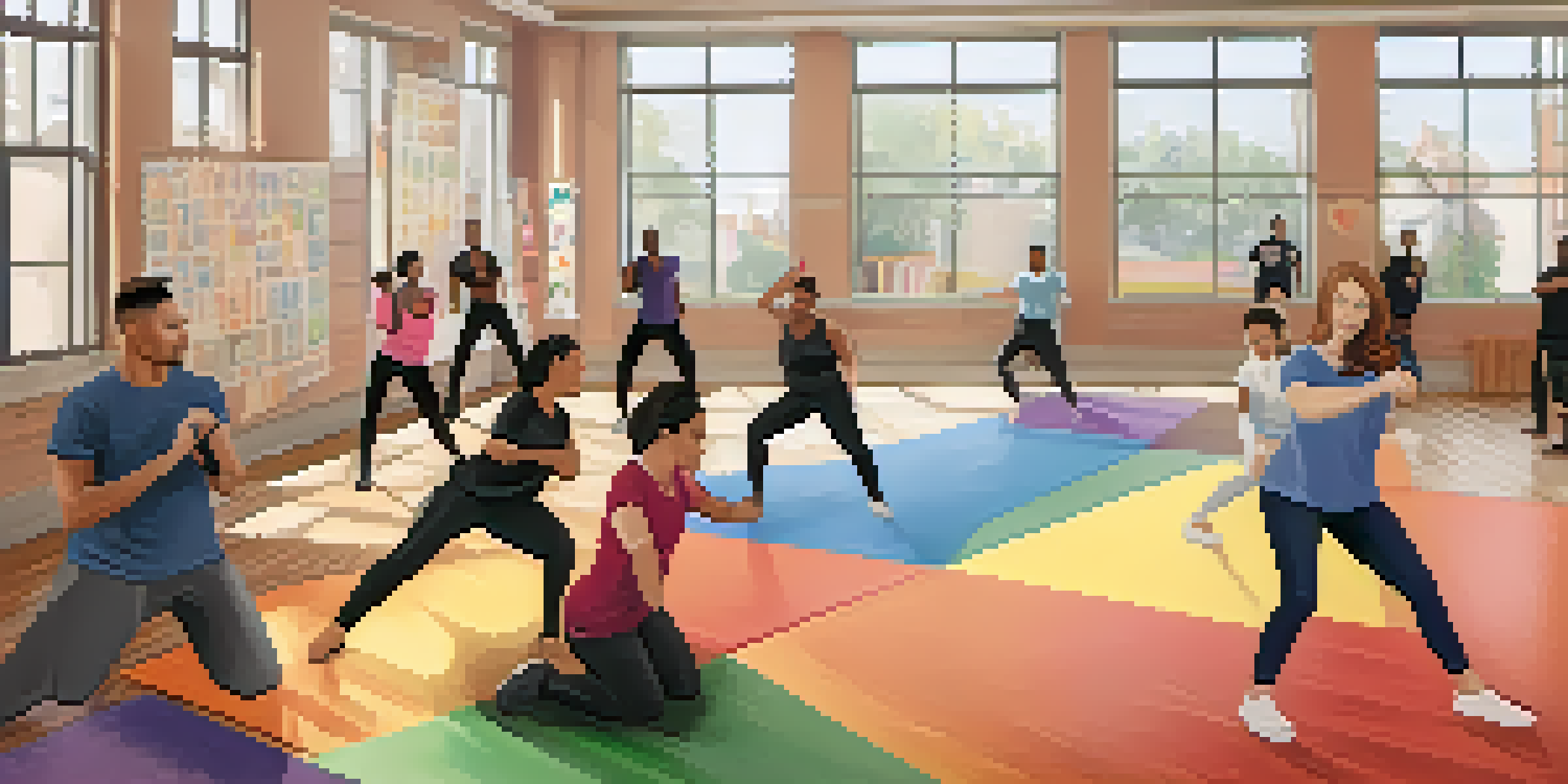Creating Safe Spaces: Self Defense for LGBTQ+ Communities

Understanding the Importance of Safe Spaces for LGBTQ+ Individuals
Safe spaces are vital for LGBTQ+ individuals, providing a sanctuary where they can express themselves without fear of judgment or discrimination. These environments foster a sense of belonging and community, which is particularly important given the challenges many face in society. By creating safe spaces, we empower individuals to embrace their identities and promote mental well-being.
Safe spaces are more than just physical locations; they are a lifeline for individuals seeking acceptance and understanding in a world that can often be harsh and unwelcoming.
In a world where hostility can sometimes overshadow acceptance, the presence of safe spaces acts as a buffer against negativity. These areas not only offer physical safety but also emotional support, allowing members of the LGBTQ+ community to connect and share their experiences. This sense of solidarity can be life-changing, reassuring individuals that they are not alone in their struggles.
Moreover, safe spaces are not just about physical locations; they can also exist in online communities, events, and support groups. By fostering these environments, we encourage dialogue and education around LGBTQ+ issues, helping to combat ignorance and build understanding. Ultimately, safe spaces contribute to a more inclusive society, benefiting everyone.
The Role of Self-Defense in Empowering LGBTQ+ Individuals
Self-defense is a crucial skill that empowers LGBTQ+ individuals to protect themselves in potentially dangerous situations. Learning self-defense techniques boosts confidence and provides practical tools to handle threats, making individuals feel more secure in their daily lives. It's about gaining the ability to respond effectively, not just physically, but also mentally.

Beyond physical safety, self-defense training fosters a sense of community and camaraderie among participants. Classes often encourage teamwork and support, creating bonds that enhance the feeling of belonging. This supportive atmosphere can be particularly uplifting for those who may feel isolated or marginalized.
Importance of Safe Spaces
Safe spaces provide LGBTQ+ individuals with a supportive environment where they can express themselves without fear of judgment.
Additionally, self-defense training often incorporates discussions around awareness and prevention, teaching individuals how to recognize and avoid risky situations. This holistic approach ensures that participants leave not only with practical skills but also a greater understanding of their own boundaries and the importance of personal safety. Overall, self-defense is a vital component of creating resilient LGBTQ+ communities.
Types of Self-Defense Techniques Suitable for LGBTQ+ Communities
There are various self-defense techniques tailored to meet the needs of LGBTQ+ individuals, focusing on both physical skills and situational awareness. Techniques such as Krav Maga, Brazilian Jiu-Jitsu, and other martial arts emphasize practical strategies for escaping or neutralizing threats. These styles often prioritize using an opponent's energy against them, making them accessible regardless of size or strength.
Empowerment begins when individuals learn to embrace their identities and take charge of their safety and well-being.
In addition to physical techniques, self-defense classes often cover verbal de-escalation strategies, helping individuals diffuse potentially violent situations without physical confrontation. Learning how to communicate effectively can prevent many conflicts from escalating, offering participants tools to navigate difficult interactions. This focus on verbal skills is especially important in fostering confidence.
Moreover, many self-defense programs emphasize personal safety strategies that go beyond physical techniques. Participants learn how to assess their surroundings, identify potential threats, and make informed decisions. By equipping LGBTQ+ individuals with a comprehensive skill set, we are not only enhancing their safety but also empowering them to engage with the world more confidently.
Building Community Through Self-Defense Workshops
Self-defense workshops provide a unique opportunity for LGBTQ+ individuals to come together and build community while learning valuable skills. These workshops often create a welcoming atmosphere where participants can share their experiences and support one another. This sense of community is essential for fostering resilience and encouraging individuals to take charge of their safety.
In addition to skill-building, workshops often feature discussions on the specific challenges faced by LGBTQ+ communities. By addressing these issues, facilitators can tailor the training to meet the unique needs of participants. This personalized approach ensures that everyone feels seen and valued, enhancing the overall experience.
Empowerment Through Self-Defense
Self-defense training equips LGBTQ+ individuals with the skills and confidence needed to protect themselves and foster community support.
Furthermore, self-defense workshops can also serve as a platform for outreach and education within the wider community. By inviting allies to participate, we can promote understanding and solidarity, helping to dismantle barriers and stereotypes. Ultimately, these workshops contribute to a more inclusive society, where everyone feels empowered to stand up for themselves and others.
Creating Safe Spaces in Local Communities
Developing safe spaces within local communities requires collaboration and commitment from various stakeholders, including community centers, schools, and local organizations. By working together, these entities can create inclusive environments that prioritize the safety and well-being of LGBTQ+ individuals. This collaboration can lead to sustainable initiatives that benefit everyone.
Community engagement is crucial for identifying areas that need improvement and resources that can be leveraged. Regular community meetings and forums can provide a platform for LGBTQ+ individuals to voice their concerns and suggest solutions. Involving community members in the decision-making process fosters a sense of ownership and ensures that initiatives are relevant and effective.
Moreover, local businesses can play a significant role in creating safe spaces by adopting inclusive policies and training staff on LGBTQ+ issues. By fostering an environment of acceptance and respect, these businesses contribute to a broader culture of safety. When communities come together to support one another, we pave the way for lasting change and resilience.
The Importance of Mental Health in Safe Spaces
Mental health is a critical component of creating safe spaces for LGBTQ+ individuals. Many face unique stressors, including discrimination and social isolation, which can take a toll on their mental well-being. Safe spaces that prioritize mental health offer resources, support groups, and counseling services, allowing individuals to process their experiences in a nurturing environment.
Creating a culture of openness around mental health is essential for removing the stigma often associated with seeking help. By fostering dialogue and education, we can encourage individuals to prioritize their mental well-being and understand that it's okay to ask for support. This emphasis on mental health creates a more holistic approach to safety and empowerment.
Advocacy for Safer Communities
Advocating for policy changes and collaboration with local organizations enhances safety and well-being for LGBTQ+ individuals.
Additionally, incorporating mental health awareness into self-defense training can enhance participants' overall experience. Understanding the psychological aspects of conflict can help individuals respond more effectively in high-stress situations. By addressing both physical and mental safety, we create a more comprehensive support system for LGBTQ+ communities.
Advocating for Policy Changes to Enhance Safety
Advocating for policy changes is crucial in creating safer environments for LGBTQ+ individuals. This can involve pushing for laws that protect against discrimination, hate crimes, and other forms of violence. By engaging in advocacy, community members can collectively voice their needs and work towards systemic change that prioritizes safety.
Grassroots movements and community organizations play an essential role in this advocacy. By mobilizing individuals and raising awareness, these groups can influence policymakers and bring attention to the unique challenges faced by LGBTQ+ communities. This collective action empowers individuals to take ownership of their safety and well-being.

Moreover, collaboration with local law enforcement can enhance safety for LGBTQ+ individuals. Building trust between communities and police can lead to better responses to incidents of violence and discrimination. Through advocacy and collaboration, we can create a culture of safety that benefits everyone, ensuring that all individuals feel secure in their communities.